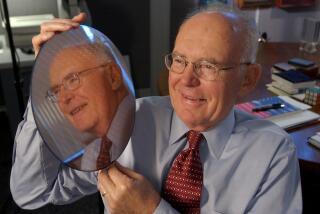Maverick May Be Spokesman in the Future
Ask anyone in the semiconductor business who will succeed Bob Noyce, Charlie Sporck and the other patriarchs as leaders of the industry, and the first name that always comes up is “T. J.,” as in T. J. Rodgers, the outspoken chief executive of Cypress Semiconductor.
That’s a bit surprising, because Rodgers has made his public name as an outsider, a gadfly, a critic of the semiconductor establishment. He infuriated many with his vehement and effective opposition to U.S. Memories, an ill-fated memory chip consortium, and he has denounced the industry’s trade association as a self-serving club looking for government handouts.
But even Rodgers’ critics, who say he is simply promoting himself and his company by adopting controversial stands that draw press attention, describe him as “brilliant” and “extremely talented,” and many hope that he can make the transition from gadfly to industry spokesman.
“He’s very bright and articulate, and he understands all the issues,” says Wilf Corrigan, chairman of LSI Logic.
Richard Shaffer, an industry observer and newsletter publisher, believes that the industry needs Rodgers to emerge as a more mainstream industry spokesman, and that he will do so. “It will be fun to look at T. J. in 20 years as the elder statesman,” he chuckles.
In fact, many in the industry believe that the environment has changed to the point that it’s time for new leadership, and that these new leaders must come--as Rodgers does--from the ranks of the younger, smaller chip companies. John East of Actel, Rodney Smith of Altera Semiconductor and Michael Hackworth of Cirrus Logic are often mentioned as key members of the new generation.
Smith, for example, says that the critical issue for the industry is intellectual property protection and that consortia aimed at preserving the manufacturing base--a key political objective of the current industry patriarchs--are a futile waste of money.
Rodgers, although paying his respects to the older generation that built the business, says there needs to be greater focus on quality improvement. He says Craig Barrett of Intel is a new leader who is tackling that problem.
And what of his own role? “There’s no such thing as a self-appointed leader,” he says. “I’m not running for anything. I’ve got my arms full here.” He does, however, acknowledge a certain ambivalence as to whether he should moderate his tone in the interest of bringing more people into his camp.
“Politics is a consensus-building activity; you have to always be in the middle of the road. I’d be a terrible politician, because over a period of time I’d aggravate one side or the other.” Yet in a field where strong opinions and big egos have been the norm, T. J. Rodgers may find a way to be himself and an industry spokesman.






